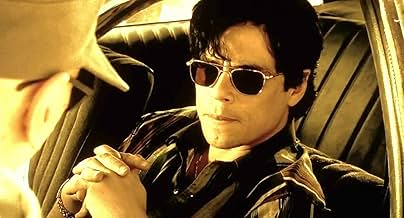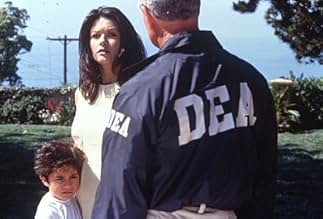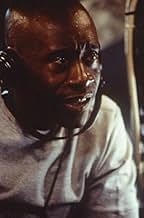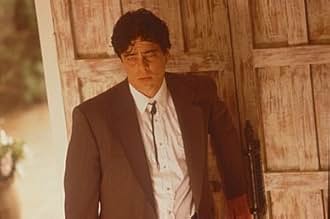Ein konservativer Richter wird vom Präsidenten ernannt, um Amerikas eskalierenden Krieg gegen Drogen anzuführen, nur um zu entdecken, dass seine jugendliche Tochter selbst cracksüchtig ist. ... Alles lesenEin konservativer Richter wird vom Präsidenten ernannt, um Amerikas eskalierenden Krieg gegen Drogen anzuführen, nur um zu entdecken, dass seine jugendliche Tochter selbst cracksüchtig ist. Zwei DEA-Agenten schützen einen Informanten. Die Frau eines inhaftierten Drogenbarons vers... Alles lesenEin konservativer Richter wird vom Präsidenten ernannt, um Amerikas eskalierenden Krieg gegen Drogen anzuführen, nur um zu entdecken, dass seine jugendliche Tochter selbst cracksüchtig ist. Zwei DEA-Agenten schützen einen Informanten. Die Frau eines inhaftierten Drogenbarons versucht, das Familienunternehmen weiterzuführen.
- Regie
- Drehbuch
- Hauptbesetzung
- 4 Oscars gewonnen
- 73 Gewinne & 86 Nominierungen insgesamt
- Salazar Soldier
- (as Jose Yenque)
- …
Empfohlene Bewertungen
I just got back from seeing it, and it certainly rates as one of the best story-based drama's I've ever seen. Being a big fan of movies with different storylines overlapping (as Magnolia) I was highly anticipating this movie. And of course the big oscar nominations and the prizes it already won made it even more desirable.
It didn't let me down one bit. The different story's were all excellent. Being that the mexican one was in my opinion the best one. Especially Benicio Del Toro (remember him in Fear and Loathing in Las vegas, the BEST drugs movie ever) being absolutely brilliant. But also the storyline involving Michael Douglas with his problems dealing with a daughter on drugs (well acted out by newcomer Erika Christensen) is remarkable. The topic drugs is clearly highly talked about especially in the United States, and this is actually the first movie which shows all aspects of it. The dealing and smuggling, the addiction, the risks of being a narcotics agent and the political point of view. It's hard to find a film that's so complete, everyone will feel connected to one of the storylines because everyone deals with or has dealt with drugs before, even if it's just a one time mariuhana use. That's why this movie will appeal to a very large crowd.
Anyway when you look at the flaws then maybe some will say that it takes too long, or that some of the scenes are a bit slow. But does everything go fastpaced in real life? It just tries to sketch a realistic view of handling with drugs. And maybe there isn't a lot of action going on, but that's not the goal of the movie.
The only thing I found when watching the movie was that the switching between movielines happened a little too often. I'd preferred if it stayed with one story a little longer. Just a tiny flaw that I personally noted.
Traffic is a film that has to sink in, when you start to think about it it just gets better and better. I can't wait for the official release here in Holland, so that I can see it again.
Oscar for Del Toro in any case !!!!!! And throw in an oscar for best film too. It deserves it.
"Traffic" caught some of the most gratifying praise in the year 2000. Does the production live up to its expectations? To some extent. It is not a movie to take the family to on a Sunday afternoon, nor is it an "entertaining" popcorn extravaganza. "Traffic" is one of the best films of the year, but it is not a movie for everyone. I had my fair share of disappointments, and I think many audiences will walk away unsatisfied by its documentary-like style and unusual structure. "Traffic" is still a great achievement in filmmaking and visual style-worthy of some, but not quite all, of its great acclamation.
The movie's director, Steven Soderbergh, won Oscar nominations for both of his movies last year: "Erin Brockovich" starring Julia Roberts, and this epic about the never ending war on drugs. That first film is entertaining and charming, but this is far more complex in its story. There are actually three separate plots here, the first detailing two Tijuana cops (Benicio Del Toro and Jacob Vargas) who find themselves in the middle of a corrupt police force, working for Gereal Arturo Salazar (Thomas Milian), Mexico's top drug aggressor who wants to shut down the Tijuana drug cartel by capturing a notorious assassin (Clifton Collins Jr.).
The second story has Michael Douglas as a conservative Ohio State Supreme Court Judge turned nation's new drug czar. He has a savage job, as we can see, but it is even more difficult being the father of a 16-year-old daughter (Erika Christensen), who gets straight A's in school, but uses heavy drugs and eventually prostitutes herself for them when the supply runs low. Amy Irving plays her mother whom herself tried every kind of drug in the market when she was young and thinks her daughter should be given more freedom in this area of maturing. Her husband strongly disagrees.
The third story is a bit more complicated, dealing with the reactions of a typical pregnant homemaker, Helena (Catherine Zeta-Jones), when she finds out her husband, Carlos Ayala (Steven Bauer), is not an executive, but a high-powered drug lord. He is taken into custody when undercover DEA agents Montel Gordon (Don Cheadle) and Ray Castro (Luiz Guzman) crack a disreputable drug cartel led by Juan Orbergon (Benjamin Bratt). Helena, with the help from her attorney (Dennis Quaid), must deal with the pressures by her husband's demanding enemies, as well as the DEA. Miguel Ferrer plays the middle-run drug dealer who is captured by the DEA agents and wants immunity for testifying against the high-powered bosses for whom he works.
"Traffic" does not have the harrowing, compassionate, hard-to-watch tone that "Requiem for a Dream" had earlier last year, which also contained three different although parallel stories. That film depicted drug use as personal success followed by desolation and punishment. "Traffic" doesn't really make drugs personal, although the plot featuring Michael Douglas' drug addicted daughter touches on the idea, and the actors do a good job of making the character's attitudes hit home, but the film is more about the war on drugs within America as a country, and how it is a battle not likely to be won anytime soon. The picture does not capture the feeling of the characters like "Requiem for a Dream" did with its highly elaborate styles and camera effects. "Traffic" just isn't as emotionally profound as the much more worthy "Requiem for a Dream."
Steven Soderbergh does manage to capture an inciting style with grainy, high contrast photography exploring the atmosphere of Mexico. He pays attention to even the smallest scenes. Take a scene where the Benicio De Toro character encounters a young married couple who complain about their stolen car. Many directors would have left this scene on the editing tables, or paid less courtesy to it because it is not as important as many other scenes. He gets the right mood, confusion of the characters, all while furthering the development of De Toro's character. Each individual scene here is interesting on its own merit.
A top notch cast contributes superb performances in "Traffic." We expect and receive good performances from actors like Michael Douglas, Amy Irving, Dennis Quaid, Benicio Del Toro, and Albert Finney, but there are also some newcomers who shine with their material, including Erika Christensen and Topher Gracer. The actors really hold our attention, and with a running time of nearly 150 minutes, that is imperative. This film is greatly constructed and perfectly cast-it is the kind of movie in which you walk out of the theater wanting to discuss your opinions about it.
Like an abstract expressionist master, Steven Soderbergh stands in the center of a canvas that stretches from Cincinnati to Tijuana. He mixes materials and splashes colors with the dash and power of a Jackson Pollock. His materials are skillful acting, lively editing, a dynamic music score, and an unflinching camera. (He did his own lensing, under a pseudonym). The artist's aim? To paint a picture of our country's drug problem.
Scripted by Stephen Gaghan, "Traffic" has its roots in a 1989 British television mini-series, "Traffik," which followed the drug trade from Pakistan to Britain. There are three loosely related stories, each with its own color coding--and as with Pollock, there is nothing random about where the paint splashes upon the canvas.
Blue hues bathe blue bloods in Cincinnati where an Ohio Supreme Court Justice (Michael Douglas) is flattered into taking a job as national drug czar, just as his bright young daughter (Erika Christensen) is seduced into addiction by her prep-school friends.
A rich golden-yellow surrounds San Diego where a comely couple (Catherine Zeta-Jones and Steven Bauer) occupy the upper links of the drug chain and spend ill-gotten cash on clothes, cars and country clubs. They are pursued by two undercover cops (Don Cheadle and Luis Guzman) who spend most of their screen time cooped up in a surveillance van.
In Mexico, a washed-out, burnished brown bespatters a desert of desperation as two Baja policemen (Benicio Del Toro and Jacob Vargas) pull off a major drug bust only to be themselves busted, by a sinister general (Tomas Milian) who notifies them that 'I will take over from here.' Each color signifies its own impenetrable culture, and when Douglas crosses into Mexico to meet his counterpart, we know (but he doesn't) that his fellow drug czar is really a drug lord.
The performances were exceptional, especially considering that no one was given star treatment. Much of the film was shot with existing light and Soderbergh kept the composition wide, letting the actors create their own space. Douglas was surprisingly believable as the would-be czar and bookends an Oscar-worthy year with his scruffy professor in the earlier "Wonder Boys." His real-life wife, Zeta-Jones (carrying their child), gave a quite credible performance as a society snob who turns ruthless when her status is threatened.
Other stand-outs include Christensen's drugged-out daughter, Del Toro's street smart Mexican cop and Cheadle's dedicated drug buster. In fact, there was not a weak performance in the bunch, including crucial cameos by veterans Peter Riegert and Albert Finney. Real people even play roles: Douglas's fictional drug czar confers with real-life senator Orrin Hatch, while actual customs officials relate their day-to-day drug enforcement dilemmas.
Each of the three stories ends with a glimmer of hope. But despite small battles being won, the film's verdict is that the larger war is plainly being lost. As if on cue, White House Director of Drug Policy, Barry McCaffrey, has resigned effective January 6, 2001. The real-life outgoing czar, a former general, has become a vocal supporter of increased funding for treatment programs.
Like Pollock, Soderbergh continues to stretch the boundaries of his art, as he did a dozen years ago with "sex, lies, and videotape," and more recently with the undervalued "The Limey." "Erin Brockovich" though fairly conventional by his standards, nevertheless completes a year any director would envy.
Rating: 3 1/2 stars out of 4
Traffic takes on the complex issues involved with the war on drugs in the United States and Mexico from the view of these nations as a whole to the very personal level. In the film, three stories unfold to illustrate the near impossibility of ever stopping the drug trade, despite the billion dollars that the US spends each year for just that cause. While the tales are related, the characters rarely, if ever, cross paths with one another. This is one of the elements that allows Soderbergh to deliver his message so effectively.
The first story features Benicio Del Toro as Javier Rodriguez Rodriguez. A cop in Baja, Mexico, he enforces the law and allows the wheels to be greased from time to time. After pulling off a huge drug bust on the Juarez drug cartel, the powerful General Salazar swoops in to confiscate all of the drugs and the credit. Later, Javier and his partner are recruited by Salazar to fight the war on drugs by aiding him in bringing down the Obregon cartel that has plagued Tijuana for some time.
Meanwhile, back in the States, Judge Robert Wakefield (Michael Douglas) of the Ohio Supreme Court is about to be appointed by the President as the nation's new leader in the drug war. For the judge, the drug war is about to become more personal than he could ever have imagined.
In San Diego, Monty (Don Cheadle) and Ray (Luis Guzman) are two federal agents perpetrating a drug bust on a slimy drug supplier named Eduardo Ruiz (Miguel Ferrer). The events that follow lead them up the drug food chain to Carlos Ayala, a well-to-do suburban man who has been smuggling illegal drugs into the country from Mexico. His arrest leaves his pregnant wife, Helena (Katherine Zeta-Jones, who was really pregnant during the film), to fend for herself while taking care of their son, court costs, and a $3 million dollar debt to the drug lords in Mexico.
Traffic, written by Simon Moore (the writer for the British miniseries, Traffik, upon which this script is based), is superbly crafted and woven. We learn just enough about each character to give us some insight into their motives for the courses they choose to follow. By the films end, matters are not neatly wrapped up; there is not a fairy tale ending. This simply adds to the realism of the issues presented within the movie. Furthermore, the intertwining stories drive home the fact that drugs are closer to you than you think.
The script is bolstered by the phenomenal, ensemble cast. Zeta-Jones and Del Toro have both received Golden Globe nominations for Best Supporting Actress and Actor in a drama for their roles in this film. Don Cheadle is superb in his role. Michael Douglas gives his usual performance while Erika Christensen does a good job as his daughter. Topher Grace (of TV's That 70's Show) is excellent as her upper-class, druggie boyfriend. Dennis Quid's character, while played adequately, is underused.
The stories were shot using various filters and lenses, neatly separating them as the film went from one to another and adding to the viewing pleasure of the movie. Mexico is filmed through a hand held camera and yellow lens to give it a dry, grainy, shaky look that heightens the feel of unrest involved with Del Toro's situation. Douglas' story is initially filmed in a hue of solemn, comforting blue. Zeta-Jones' story is filmed without the use of lenses, suggesting that her situation and actions are the most realistic and achievable of all those presented.
Despite some dialogue that spouts off statistics and seems a bit preachy, Traffic ranks among the top ten films of 2000, surpassing even Soderbergh's other venture, Erin Brokovich. Don't be surprised if this film picks up the Oscar for Best Picture.
By film's end, the message is clear and powerful. The fight against drugs is a long, uphill battle, but it is better than no battle at all.
Wusstest du schon
- WissenswertesThe scene in which Michael Douglas takes his trip to the California border crossing to discuss drug interdiction was actually shot at the Tijuana crossing. The video and sound quality are so low in part because it wasn't intended to be part of the movie. Douglas, out of character, started asking Rudy M. Camacho about drug trafficking on the border. At the time, Camacho was the real-life Customs chief in charge of the California border crossings. Steven Soderbergh began filming it with a hand-held camera, praying that Camacho wouldn't address the actor as "Mr. Douglas".
- PatzerFrancisco Flores has distinctive wounds on his left cheek and forehead when first shown in surveillance photos, but those wounds are only visible after he is tortured by General Salazar's men, long after the photos were taken.
- Zitate
General Ralph Landry: You know, when Khruschev was forced out, he sat down and wrote two letters and gave them to his successor. He said - "When you get yourself into a situation you can't get out of, open the first letter, and you'll be safe. When you get yourself into another situation you can't get out of, open the second letter". Well, soon enough, this guy found himself into a tight place, so he opened the first letter. Which said - "Blame everything on me". So he blames the old man, it worked like a charm. He got himself into a second situation he couldn't get out of, he opened the second letter. It said - "Sit down, and write two letters".
Robert Wakefield: [laughs] Yep.
- Crazy CreditsThere are no opening credits except for the film's title in the lower left corner.
- Alternative VersionenThe Criterion Collection DVD is presented in 1.85:1, whilst the Criterion Blu-ray is presented in 1.78:1. According to the Blu-ray insert, the latter is the director's preferred ratio.
- SoundtracksGive The Po' Man A Break
Written by Fatboy Slim (as Norman Cook)
Performed by Fatboy Slim
Courtesy of Astralwerks Records
Top-Auswahl
Details
Box Office
- Budget
- 48.000.000 $ (geschätzt)
- Bruttoertrag in den USA und Kanada
- 124.115.725 $
- Eröffnungswochenende in den USA und in Kanada
- 184.725 $
- 31. Dez. 2000
- Weltweiter Bruttoertrag
- 207.515.725 $
- Laufzeit2 Stunden 27 Minuten
- Farbe
- Sound-Mix
- Seitenverhältnis
- 1.85 : 1





































